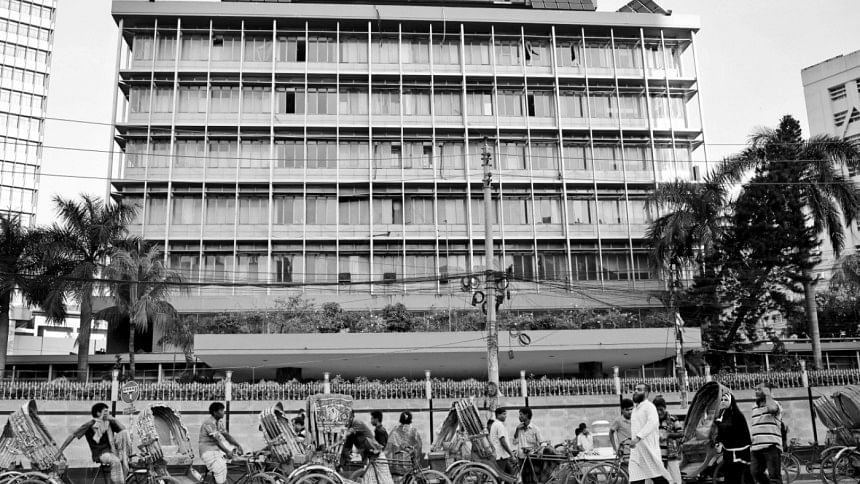Bangladesh Bank's role as an independent regulatory body

The role of the central bank is quite significant in regulating the banks and financial institutions in a country. It's closely linked with the performance of the economy, and of all sectors like trade, commerce, industry, exports, imports and most importantly, ensuring the financial stability in an economy. Central banks everywhere have a very difficult situation in its struggle to stay away from the influence of politics and politicians. The independence of a central bank is directly related to its efficacy in ensuring independence in the affiliated banks and financial institutions under its control. The matter boils down to governance issues. The modern notion of independence of the central bank evolved overtime. Following the Great Depression of 1929-1939, the US and other developed countries gave the central bank the power to set the objectives, goals, targets and instruments of monetary policy. In the wake of inflation in 1960s and 1970s many central banks were successful in keeping their policies out of political influence. But in the US the then Chief of Staff of President Regan advised Mr Paul Volcker, the Chairman of Federal Reserve Bank of USA, not to raise policy rates ahead of 1984 election. Mr. Volcker left the meeting without a word but his policy ultimately resulted in lower inflation and steady economic growth. As a result, independence of central bank has been emphasised upon by economists and bankers.
The independence of the central bank is viewed from two major aspects. One is “goal independence” and the second is the “instrument independence”. In all these features of independence, the central bank enjoys fairly greater amount of autonomy in comparison to the other regulatory bodies of the government. The major goals, maintenance of price level (inflation) and growth, are usually taken as the primary ones. However, the growth rate and inflation rate are often determined by the broad policy consultation of the government in achieving accelerated growth and financial stability. Federal Reserve Bank of USA (FED) probably enjoys maximum independence and autonomy. The Bank of England till 1997 was not purely independent because it was largely influenced by the Chancellor of the Exchequer. The European central bank which oversees interest rates for all countries sharing the common Euro currency was independent since 1998. But recently, US government is putting increasing pressure on FED to reduce interest rate, which is a sign of political intervention on FED. The Bank of Japan in 2013 agreed to coordinate policy with the government, a step towards reducing the independence of its central bank.
Central bank autonomy is a debatable but crucial issue. However, to achieve the objectives of the bank, such as inflation control and economic stability, better financial management etc., it is necessary for the central bank to be free from all influences. Thus, the bank should be fully autonomous in all its functional and decisional activities.
Some attributes of interdependence are whether the central bank can refuse credit to the government; whether it can meet its expenses without depending on government; whether its governor or board of directors can function independently; whether its governor is independent in following monetary policy; whether it is free to choose its monetary instruments; and finally, whether it is free to regulate the banking policy and the banks.
Full autonomy of the central bank can be exercised in achieving three types of independence: “Political”, “Macroeconomic” and “Financial”. Political independence encompasses objectives like price stability, independent board of directors who will be appointed for long terms, separate from others, accountability of the central bank's action to the parliament and legislature, and mechanism for complete dispute resolution. Macroeconomic independence indicates the formulation of monetary and exchange rate policies without any interference. Financial independence focuses on transparency of accounts, adherence to prudential norms, quasi-fiscal subsidies such as preferential interest rate, exchange rate guarantees, restriction of the distribution of non-cash profits and linkage of losses and net worth of the banks. Therefore, the autonomy must be both, “administrative” and “operational”.
The main purposes of Bangladesh Bank are monetary policy functions, bankers' bank, banker of the government and regulators as well as supervisor of the commercial banks. The Bank of England (BoE) which basically deals with monetary policy functions and other functions is regulated by Prudential Regulation Authority (PRA) and Financial Conduct Authority (FCA), two independent bodies under the overall guidance of BoE. Most of the central banks have the dual functions like those of Bangladesh Bank. Therefore, its tasks are enormous. The performance of the economy as a whole and that of the different sectors are closely linked with the performance of the Bangladesh Bank. The vison and mission, given below, state the functions of Bangladesh Bank.
Vision
To develop continually as a forward-looking central bank with competent and committed professionals of high ethical standards, conducting monetary management and financial sector supervision to maintain price stability and financial system robustness, supporting rapid, broad based inclusive economic growth, employment generation and poverty eradication in Bangladesh.
Mission
Bangladesh Bank is carrying out its functions as the country's central bank as per the following mission statements:
Formulating monetary and credit policies;
Managing currency issue and regulating payment system;
Managing foreign exchange reserves and regulating the foreign exchange market;
Regulating and supervising banks and financial institutions, and advising the government on interactions and impacts of fiscal, monetary and other economic policies. economic policies.
The vision and mission of Bangladesh Bank are quite appropriate but putting these into action has faced serious challenges and limitations. In the context of Bangladesh Bank, the debates on macro-economic issues centred around how Bangladesh Bank can set up monetary targets without political pressure and how far monetary policy can be implemented without any political and structural limitations. The authority of the Bangladesh Bank over the constituent banks and financial institutions has recently shown some limitations in controlling corruption, increasing non-performing loans, lack of good governance, weak management and finally erosion of public faith in banks. It seems that Bangladesh Bank, due to both “internal” (within the bank itself) and “external” (outside the purview of the bank) hurdles, is finding it difficult to exert effective control over the banking sector. The pressure groups of stakeholders, namely Bangladesh Association of Bankers (BAB), an association of bank owners and the Association of Bankers, Bangladesh (ABB), an association of CEOs/MDs of banks, play vital roles in the regulatory aspects of the banking sector.
It must be pointed out that a balance must be made between the regulation and independence of a bank. This means that banks should neither be overregulated nor should they be left alone to enjoy complete freedom, which often results in banking disasters. This point has been very aptly articulated by Jean Tirole, the Nobel Prize winner in Economics in a book jointly written with his colleagues. It is important to keep in mind what financial regulation is meant to achieve. The most important objective is to protect depositors, investors, the general public and the real economy (real goods and services) as a whole. The second rationale for regulation is to minimise the domino effect of the systematic risks of the financial institutions which destroy the foundation of economic activities resulting in loss of real output, lower growth, higher unemployment and reduction of human welfare. Good governance in the banking sector is an important agenda of our country, especially in the present context of the crisis in the banking sector.

A perfect example of lack of both transparency and accountability are Sonali and Basic Bank scams where both the borrowers and the officials colluded in a non-transparent manner and siphoned off huge amounts of public money. Those responsible for such fraud have not yet been subjected to strong administrative and legal actions, in fact they got “perverse incentives” and the honest and dedicated people working in the same bank and elsewhere were marginalised and pushed back into oblivion.
In Bangladesh, there is a “dual” system of control of the banking sector. The state-owned commercial banks (SCBs) like Sonali, Rupali, Janata and Agrani, and specialised banks like BASIC Bank Limited (Bangladesh Small Industries and Commerce Bank Limited), Bangladesh Krishi Bank (BKB), Bangladesh Development Bank Ltd. (BDBL), and some statutory banks like Ansar VDP Unnyan Bank and Karmasangsthan Bank are controlled by the Bank and Financial Institution Division of the Ministry of Finance. On the other hand, all private commercial banks, foreign banks, non-bank financial institutions are regulated by the Bangladesh Bank. This 'duality' of control has resulted in uncoordinated, often weak, policy measures for the government regulated banks. Bangladesh Bank has serious limitations in enforcing prudential and management norms in these banks, which have made the whole banking sector weak and vulnerable through 'domino effect’. Small economies like Bangladesh are by no means invulnerable to fallouts from global downturns or negative spill-over of policies of large economies and therefore have a strong stake in global stability and economic growth. In forums such as the G-20, countries like Bangladesh need to argue forcefully for the same priority in stability as in recovery, as well as for stability action agenda going beyond addressing the symptoms (i.e. lapses in risk management, inadequacies of regulation and supervision) to addressing underlying causes (i.e. lax policies, non-compliance of prudential and management norms, poor financial reporting, unbridled liquidity expansion that incubates bubbles). Financial crisis of 2007-08 is due to massive regulatory failure, a breakdown that goes all the way from regulatory fundamentals to implementation of prudential and management norms.
To have an independent and effective Bangladesh Bank, three major steps are necessary: (a) a strong and independent central bank with more focus on core banking issues, (b) a well thought out set of prudential and management norms of the central bank that are not subject to frequent changes due to external political/administrative pressure, and (c) a system of prompt corrective actions for management of crises and for legal/administrative actions against persons responsible for crises in a particular bank or in the banking 'system' as a whole.
In a real-world situation, extraordinary independence and full autonomy to the central bank may not be easily achieved. Therefore, central banks like Bangladesh Bank can minimise political and other external pressure by constantly engaging with them and gaining public support for actions which may make Bangladesh Bank autonomous and effective. Whether in good or bad times, supervisors always face pressure from lobbyists and from politicians that can undermine the stability of the financial system.
For Bangladesh Bank to be successful in regulating the financial sector, it has to have very relevant and pragmatic policies, prudential management rules and ensure that these are fully followed by all banks and financial institutions. “Discretionary” powers or “ad-hoc measures” have to be avoided in order to safeguard the independence and autonomy of Bangladesh Bank. The typical case of “policy” versus “discretion” has to be resolved with strong stance of Bangladesh Bank where policies and rules will be supreme—not the discretionary powers of any individual and agency. Time has come for Bangladesh Bank to strike a balance, showing appropriate professional stance while avoiding the danger of politically motivated reforms in a highly technical domain.
Dr Salehuddin Ahmed is, Former Governor, Bangladesh Bank and currently, Professor, BRAC University.

 For all latest news, follow The Daily Star's Google News channel.
For all latest news, follow The Daily Star's Google News channel. 



Comments